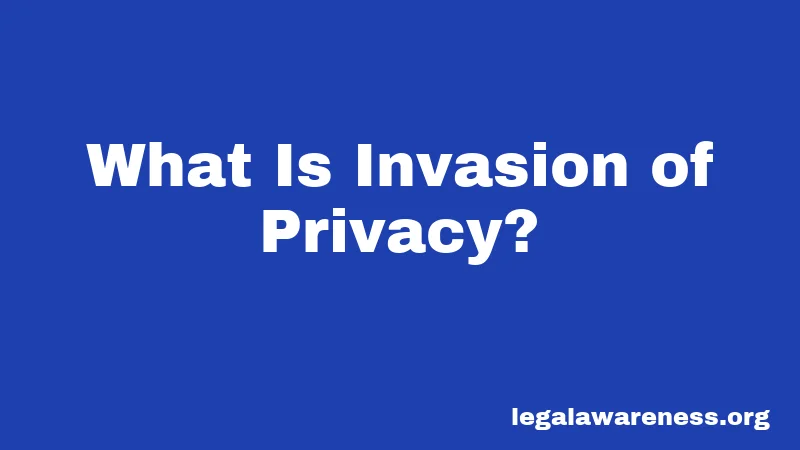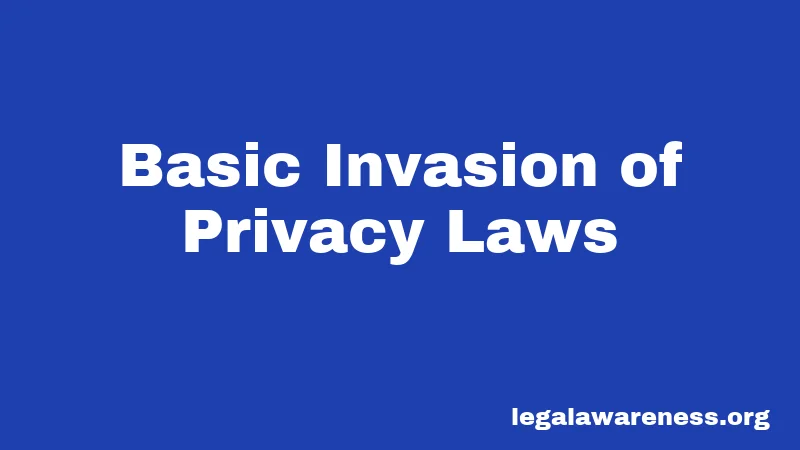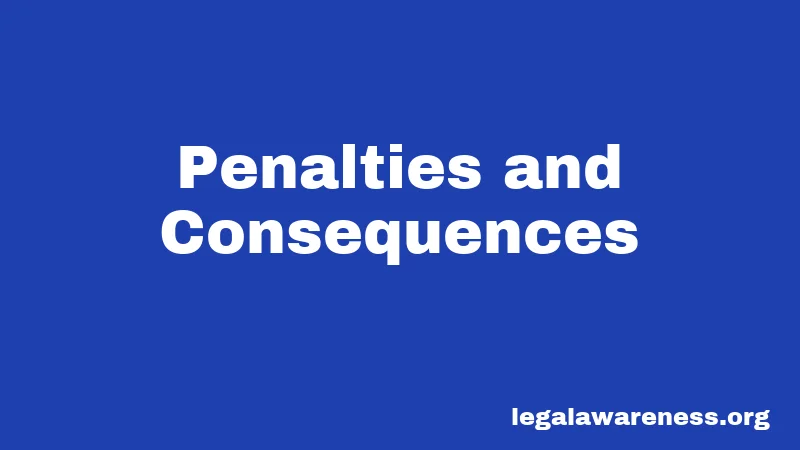Florida Invasion of Privacy Laws (2026): Your Rights and What’s Illegal
Most people have no idea how serious Florida’s invasion of privacy laws actually are. Seriously. You could be breaking the law right now without even realizing it. Whether someone secretly records you, shares your private information, or violates your personal space, Florida takes privacy violations seriously. The penalties can hit hard—we’re talking jail time, hefty fines, and a mark on your record. Let’s break down exactly what counts as an invasion of privacy in Florida and what you need to know to stay on the right side of the law.
Ready? Let’s dive in.
What Is Invasion of Privacy?

Okay, pause. This is important. Invasion of privacy isn’t just about someone being nosy. It’s a legal violation—a crime or civil case that happens when someone seriously violates your right to be left alone. Basically, it’s when another person or company acts in a way that intrudes on your personal life, your body, or your personal information without your consent.
Florida recognizes four main types of invasion of privacy violations. Think of them as different ways someone can cross the line. Here’s what they look like: intruding into your private moments, sharing your personal secrets without permission, misrepresenting you in a false way, or using your name and face for money without asking. Each one is a problem. Each one can get you in serious legal trouble.
Your Constitutional Right to Privacy
You’re not alone if you think privacy is pretty fundamental. Florida agrees with you. In fact, Florida’s constitution guarantees that every natural person has the right to be let alone and free from governmental intrusion into their private life.
This is a big deal. In 1980, Florida added this explicit right to privacy to its constitution, which is broader than the privacy protections in the federal Constitution. That means Florida takes privacy seriously—really seriously. But here’s the thing: this constitutional protection mostly applies to government intrusion, not violations by private people. Still, it shows Florida’s commitment to protecting your personal life.
Basic Invasion of Privacy Laws

Intrusion Into Private Affairs
Let me break this one down. Intrusion happens when someone deliberately enters or spies on your private space or activities without permission. Honestly, this is probably the most common type of invasion of privacy case.
Here’s what counts: secretly watching someone undress, planting hidden cameras in bedrooms or bathrooms, recording private conversations without consent, or breaking into someone’s private space to spy on them. Not sure what counts as a violation? Think of it this way—if a reasonable person would expect to have privacy in that moment and place, you can’t violate it without permission.
Public Disclosure of Private Facts
This one’s about sharing. When someone publicly reveals private information about you that would offend a reasonable person, that’s a problem. We’re talking about spreading embarrassing personal details, sensitive medical information, or secrets you never wanted shared.
The tricky part? The information has to be true. If someone lies about you, that’s defamation, not invasion of privacy. But if they tell the truth about something deeply personal—something that’s nobody else’s business—they’ve crossed the line.
Appropriation of Name or Likeness
This type is pretty straightforward. Someone can’t use your name, photo, or face for commercial gain without your permission. Period. Whether they’re selling a product, advertising a service, or making money off your image in any way, they need your approval first.
False Light
Hold on—Florida actually doesn’t recognize false light invasion of privacy as a separate claim. The state decided that defamation laws already cover those situations. So if someone presents you in a false way that’s damaging, that falls under defamation, not invasion of privacy.
Digital Voyeurism Laws
This part got serious in 2024. Florida completely revamped its laws on digital voyeurism, and the penalties are no joke.
What Is Digital Voyeurism?
In 2024, Florida legislature passed CS/CS/HB 1389, which changed the offense from “video voyeurism” to “digital voyeurism.” Digital voyeurism means secretly recording, broadcasting, or viewing someone who is undressing, exposing their body, or in any other intimate state. You do this without their knowledge or consent, and you do it for amusement, entertainment, sexual gratification, profit, or to degrade them.
This is serious. Really serious.
Where Privacy Is Expected
Florida law defines exactly where people have a reasonable expectation of privacy. These places include your home, bathrooms, changing rooms, fitting rooms, dressing rooms, and tanning booths. Basically, anywhere you expect to undress or disrobe in private. If someone records you in these places without permission, they’ve broken the law.
What Counts as Breaking the Law
You commit digital voyeurism if you secretly use any camera, phone, or recording device to view, record, or broadcast someone in a private state. It doesn’t matter if you actually share it—the secret recording itself is the crime. But it gets worse. If you share that video or image with other people, you’ve committed an additional crime: digital voyeurism dissemination. And if you sell it? That’s commercial digital voyeurism dissemination. Each one is a separate offense.
Penalties and Consequences

Wondering how serious this really is? Let’s talk consequences.
Digital Voyeurism (First Offense)
For a first offense of digital voyeurism, if you’re under 19, you’re looking at a first-degree misdemeanor. A first-degree misdemeanor is punished with up to one year in jail, up to one year of probation, and a fine of no more than $1,000.
But if you’re 19 or older and it’s your first offense? You face a third-degree felony. That means up to five years in prison, five years of probation, and a fine up to $5,000. Much worse, right?
Digital Voyeurism Dissemination
Here’s where it gets tougher. If you share, distribute, or transfer any digital voyeurism image or recording, you’ve committed a felony of the third degree. This is punishable by law and applies regardless of how old you are. Each time you share is a separate offense. That means if you send the same image to three people, that’s three separate crimes.
Commercial Digital Voyeurism Dissemination
Selling intimate images without consent? That’s a felony too. And the penalties keep getting worse depending on the circumstances.
Repeat Offenses and Crimes Against Minors
Second convictions are much more serious. A second or subsequent conviction can be charged as a felony in the third degree, resulting in up to five years in jail, five years of probation, and a fine of up to $5,000.
And if the victim was a minor? The penalties jump even higher. Digital voyeurism against minors is treated as a more serious felony with harsher penalties and lifetime sex offender registry requirements.
Statutory Civil Law Claims
Beyond criminal charges, you can also file a civil lawsuit. Think of it like this: the government pursues criminal charges, but you can also sue the person personally for damages.
The Four Types of Civil Claims
If someone violates your privacy, you can sue for one or more of these reasons: intrusion into your private affairs, public disclosure of private facts, appropriation of your name or likeness, or false light (though Florida doesn’t recognize false light separately anymore). In a civil case, you’re asking the court to award you money for the harm caused.
What You Can Recover
If you win a civil invasion of privacy case, you might get compensation for emotional distress, harm to your reputation, lost earnings, and other damages. The amount depends on how serious the violation was and how much harm you suffered.
Wiretapping and Electronic Communications
Florida also has strict laws about intercepting communications. Florida Statutes Chapter 934 governs the interception and disclosure of wire, oral, or electronic communications. Basically, you can’t secretly record someone’s phone calls, texts, or private messages without their consent. And you can’t share those communications if they were illegally intercepted.
This includes listening in on someone’s conversation without permission, recording a private call, or accessing someone’s emails without authorization. These are serious federal and state crimes that come with hefty prison time.
Special Circumstances and Exceptions
Not everything that might seem like an invasion of privacy is actually illegal. There are some exceptions you should know about.
Law Enforcement Surveillance
Police officers can conduct surveillance for legitimate law enforcement purposes. If they have a warrant, they’re allowed to do things that would normally violate someone’s privacy. That’s the whole point of warrants—they give police legal authority.
Business and Home Security
Companies and homeowners can install security cameras in certain places. If there’s an openly visible security camera, or if there’s a conspicuous sign that says a surveillance system is in place, that’s generally not an invasion of privacy. People can see it’s there. But hiding a camera? That’s different. That’s a crime.
Consent Changes Everything
Here’s the big one. If someone consents to being recorded or having their information shared, there’s no invasion of privacy. Consent is the game-changer. But consent has to be real and clear. It can’t be forced or tricked out of someone.
How to Protect Yourself
Stay informed and stay safe. Here’s what you should do to protect your privacy in Florida.
Know Your Surroundings
Be aware of where you are and what’s visible. In places where privacy is expected, pay attention. Close blinds. Lock doors. Don’t assume your private moments are actually private unless you’ve taken steps to make them that way.
Understand Your Rights
You have the right to be let alone. You have the right to keep your personal information private. You have the right to control how your image and likeness are used. Know these rights and don’t let anyone push you around.
Check Your Devices
Stay aware of what devices are in your space. Look for hidden cameras. Check your WiFi network for unauthorized devices. If you feel unsafe, call local police.
Be Careful With Consent
Never give permission casually. When you’re asked to consent to recording, photographing, or sharing information, ask questions. Why do they need it? How will they use it? Can you revoke consent later? It’s okay to say no.
What to Do If Your Privacy Is Violated
Think it happened to you? Don’t panic. Here’s what to do.
Gather Evidence
If possible, document what happened. Save any messages, screenshots, photos, or videos that show the violation. Write down dates and times. Write down what happened. Get names of witnesses if there are any. This evidence matters.
Report to Police
File a police report. You can report digital voyeurism, wiretapping, unauthorized recording, or any other privacy violation. Be clear and specific about what happened. The police will investigate and can make an arrest if they find evidence of a crime.
Consider a Lawyer
Talk to a criminal defense lawyer or personal injury lawyer depending on whether you want criminal prosecution or a civil lawsuit. Many lawyers offer free consultations. An experienced privacy lawyer can explain your options and help you understand what damages you might be entitled to recover.
Notify Relevant Companies
If your privacy was violated online, report it to the social media platform or website where it happened. They can remove the content and potentially ban the person responsible.
Frequently Asked Questions
What’s the difference between invasion of privacy and other crimes like cyberstalking? Invasion of privacy focuses on someone violating your private space or information without consent. Cyberstalking is about repeated harassment with intent to frighten or harm. You can face charges for both in the same situation.
Can I be charged for recording my own private moments? No. You have the right to create intimate images of yourself. The crime is when someone else secretly records you without consent.
If someone took a private photo of me, do I have to prove they shared it for this to be a crime? No. The act of secretly recording is the crime itself. Sharing it is an additional, separate crime. You don’t have to wait for it to be shared to report it.
What happens if a minor commits digital voyeurism? If you’re under 19, the penalties are reduced compared to adults, but you can still face a first-degree misdemeanor charge. However, if you’re 18 or older and the victim is a child under 16, the penalties jump dramatically to felony level.
How long do I have to report an invasion of privacy? For some crimes like digital voyeurism, there are specific time limits called statutes of limitations. Generally, you have several years from when you discovered the violation to report it or file a lawsuit. Talk to a lawyer for your specific situation.
Final Thoughts
Florida takes privacy seriously, and now you know why. These laws exist to protect you—your body, your image, your personal information. Whether it’s someone secretly recording you, sharing your secrets, or stealing your identity for profit, Florida’s laws make it clear: your privacy matters.
The rules can seem strict, but honestly, they make sense. They protect real people from real harm. If you’re unsure about something, ask. If someone violates your privacy, report it. And if you’re tempted to record someone privately or share someone’s image without permission? Don’t. The consequences aren’t worth it.
Now you know the basics. Stay informed, stay safe, and when in doubt, look it up or ask a lawyer. Your privacy is worth protecting.
References
- Florida Constitution Article I, Section 23 – Right of Privacy
- Florida Statutes § 810.145 – Digital Voyeurism
- Florida Statutes § 810.14 – Voyeurism
- Florida Statutes Chapter 934 – Interception and Disclosure of Communications
- Florida Digital Bill of Rights (Effective July 1, 2024)
- Florida Department of Law Enforcement – Crime Victim Resources
- Florida Attorney General – Privacy and Data Security
